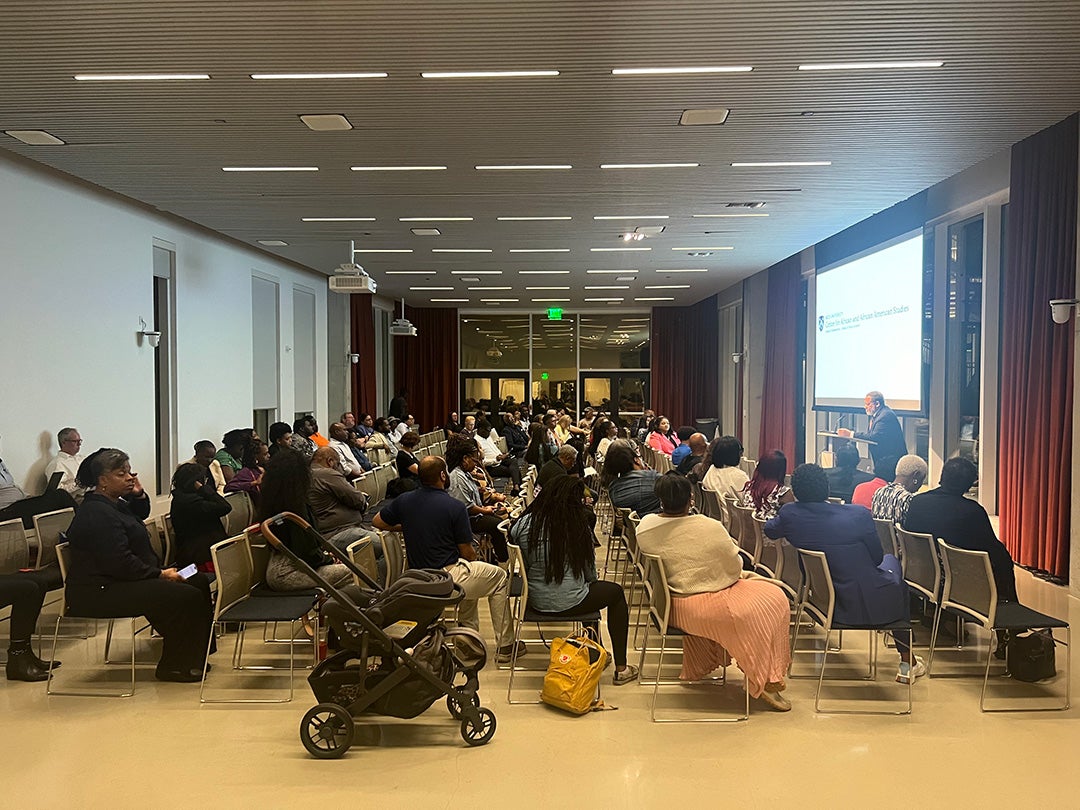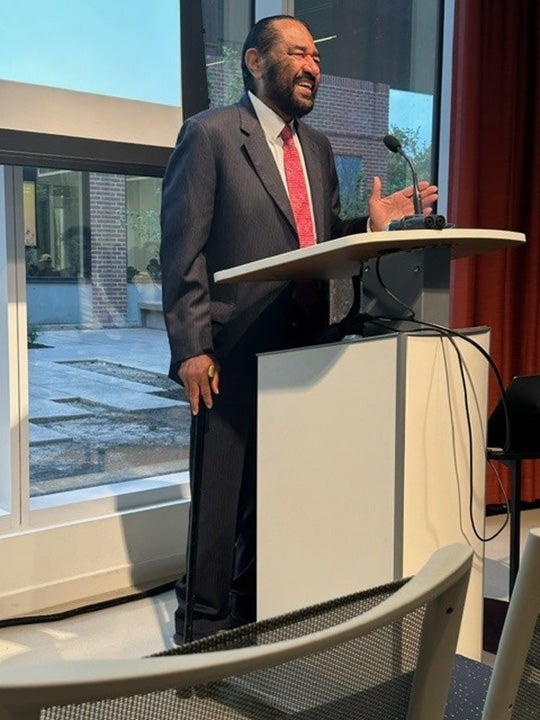
Renowned scholar and public intellectual Michael Eric Dyson delivered a thought-provoking speech at Rice April 1, spurring conversations about race, history and the imperative of confronting what he called “America’s amnesia.” His lecture was hosted by Rice’s Center for African and African American Studies with co-sponsorship from the Center for Engaged Research and Collaborative Learning, the School of Social Sciences and School of Humanities.
Rep. Al Green (D-Texas) remarked that he was “blessed, honored and privileged to be here to hear one of the preeminent speakers of our time,” after which higher education pioneer Ruth Simmons, a President’s Distinguished Fellow at Rice, introduced the speaker of the hour.
Simmons offered a tongue-in-cheek introduction to Dyson, whom she has known for many years since their first encounter at Princeton University. Simmons reminisced about their initial meeting, playfully noting Dyson’s occasional attempts to offer unsolicited advice.
“Over the subsequent decades, he has consistently, and I must say inappropriately tried to advise me on a range of matters about which he lacks knowledge and expertise,” Simmons said, drawing laughter from the audience.

Simmons also conveyed deep respect for Dyson’s myriad strengths and accomplishments. She painted a vivid picture of his impact, highlighting Dyson’s unwavering commitment to challenging injustice.
“He has come to be known as one of the most probing and compelling public intellectuals and social critics in the world today,” Simmons said. “In this capacity, he is persistent in rebuking any and all for actions that dehumanize and punish others because of their gender, their race, their national origin, their sexual identity, religion or economic status.”
Simmons delved into Dyson’s multifaceted role as both ethnographer and shaman, adeptly interpreting and divining the meaning behind the diverse contributions of artists and activists.
“He captures the granularity of life in a diverse America, analyzing the startling creativity of writers, scholars, performers and activists,” Simmons said. “Beyond mere reportage, he is a brilliant polyglot chronicling aspects of Black life that might elude us.”
Drawing attention to Dyson’s profound intellectual depth and voracious appetite for knowledge, Simmons emphasized his prowess in engaging with a multitude of fields and forms of expression.
“If you follow his musings at any time and in any medium, you’ll understand how the intensity and endurance of his thought process, as shown by the skilled practice of hermeneutics and his voracious consumption of a multitude of fields and forms of expression, makes composing lengthy texts an automatic progression of his thought,” Simmons said, referring to the more than 25 books Dyson has authored.
Dyson, a Distinguished Professor of African American and Diaspora Studies at Vanderbilt University, began his speech with an urgent call to recognize the interconnectedness of Black history and American history.
“Let’s not forget Martin Luther King Jr. was widely hated when he was alive,” Dyson said.
Speaking just days before the anniversary of King’s assassination, Dyson set the tone for discourse that would confront uncomfortable truths about America’s past and present. He invoked the words and legacy of King, urging the audience to resist the distortion of his message for contemporary political agendas, which includes the manipulation of King’s vision of colorblindness for purposes antithetical to his principles.
“Even as we fight against the inimical forces that seek to undermine us, Martin Luther King Jr. has been used so blatantly to justify ideas to which he would never subscribe,” Dyson said.
His critique extended to the academic and ideological realms, where Dyson dissected the roots of America’s amnesia and the pervasive biases that shape scholarly discourse and societal narratives. The scholar didn’t shy away from acknowledging the complexities within the Black community’s relationship with its own history, calling for introspection and self-critique. Much of his lecture, however, offered a critique of western knowledge traditions and debates regarding the relevance of the humanities in higher education.
“The lie of the amnesia is not simply what the dominant culture did,” Dyson said. “Black folk, most of us did not get involved in the civil rights movement. We didn’t march.”
As Dyson delved into the aftermath of George Floyd’s murder and the subsequent corporate gestures of solidarity, he underscored the cyclical nature of progress and backlash, cautioning against complacency in the face of fleeting displays of solidarity.
“The white backlash was ferocious, just as it was in the second Reconstruction, the first Reconstruction,” Dyson said.
He commemorated King’s legacy by emphasizing the imperative of speaking truth to power, even when it is unpopular.
“Martin Luther King Jr. was a great figure, a man of epic achievement, a man of tremendous intellectual courage and a man who spoke the truth, whether it was popular or not,” Dyson said, concluding his speech.
Learn more about CAAAS and its upcoming events here.

